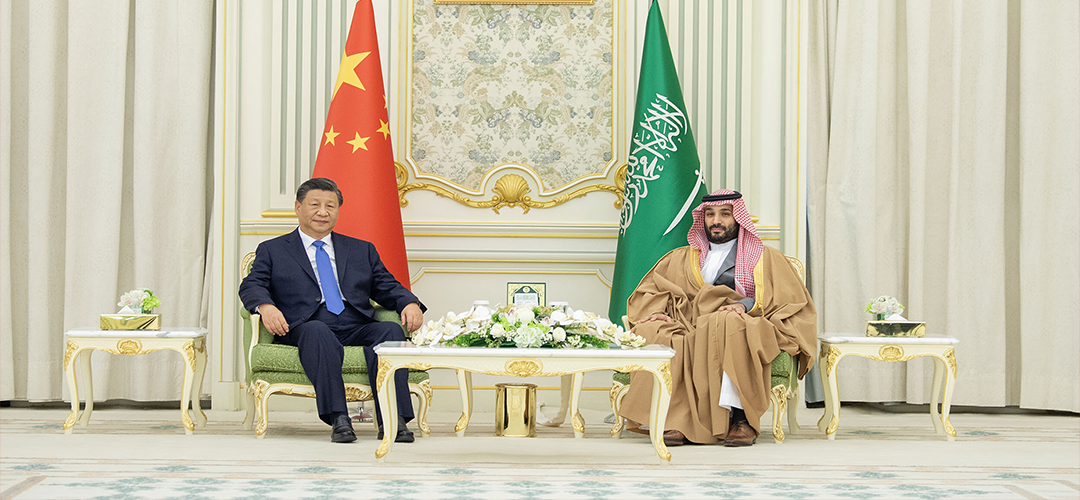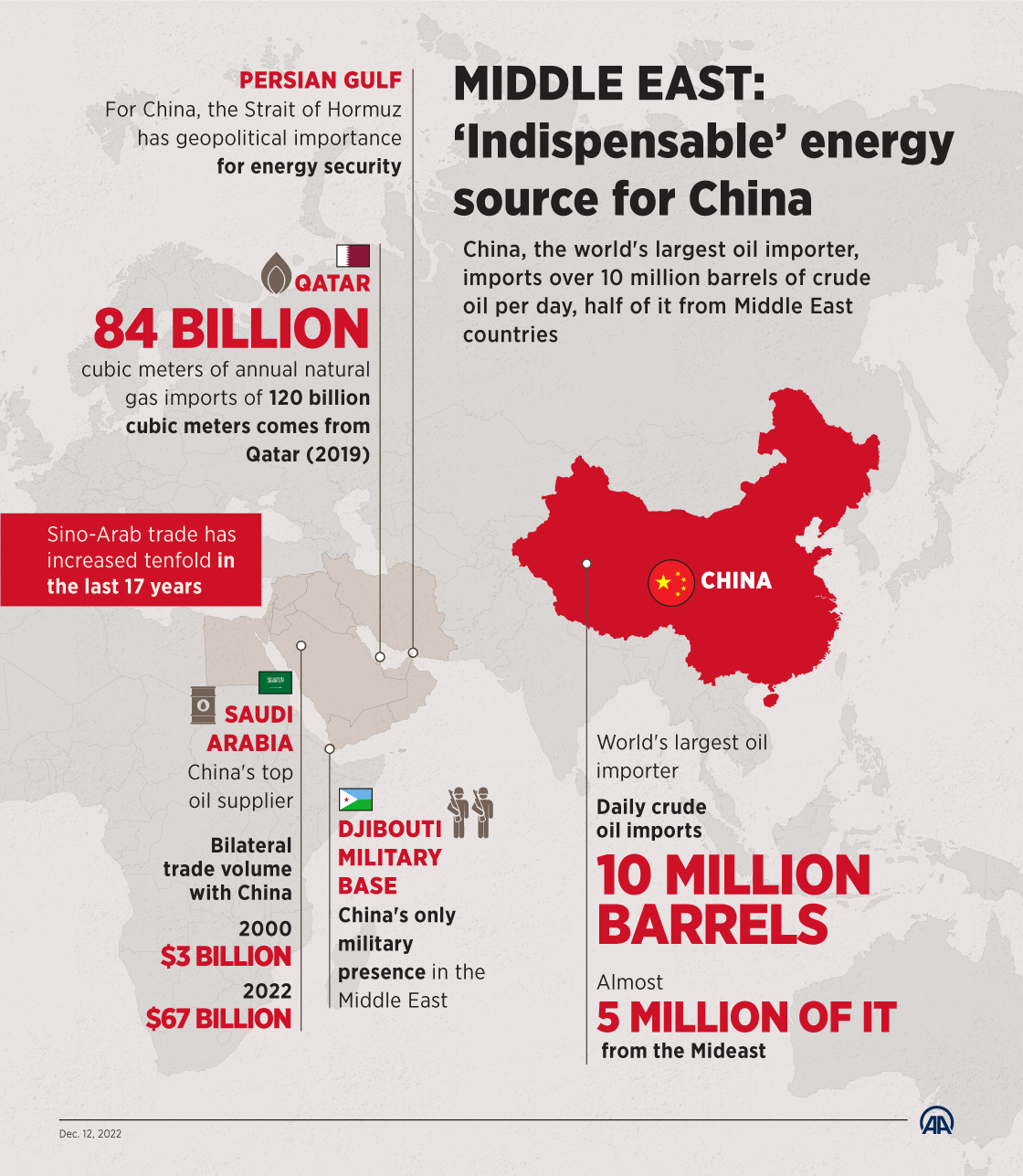MORE THAN A DIPLOMATIC EVENT!
December 17, 2022 | Expert Insights

Western capitals must have surely been rattled at the rapid progress China’s “wolf diplomacy’ is making in extending Beijing’s influence in areas that the U.S. and its European allies have traditionally dominated.
Coming so close on the heels of the November 21st Qatar Energy and Sinopec deal that will guarantee China Liquified Natural Gas (LNG) supply for the next 27 years, secure from market volatility and competition, the visit of President Xi Jinping to Riyadh grows in significance.
International visits by national leaders are not astonishing in a multilateral environment, but the timing and motives are. Chinese President Xi Jinping's visit to the Middle East is the second significant overseas trip since the beginning of his third term in October, following G20 and APEC summits last month, highlighting the region's growing strategic significance for China.
The trip has not only resulted in positive economic and commercial outcomes but has also shown that China will increasingly support Middle East peace and continue supporting regional development in the strategically significant region.
However, it was interesting to note that before Xi arrived in Riyadh, there were plaintive cries in the U.S. media that China was "stepping into their shoes" and meddling in their "defined sphere of influence." This concern is fair given that the kingdom went above and beyond to prepare for Xi's red-carpet arrival and the extent of discussions planned that overshadowed the arrangements made for the Biden visit.
Background
Despite the physical distance that separates them, China and the Arab Gulf states share a long history that dates back about 2,000 years. The ceaseless streams of caravans along the land-based Silk Road and the billowing sails along the maritime Spice Road are a testament to the deep interaction between the Chinese and Arab civilisations.
Fast forward to the late 1970s, new prospects for bilateral collaboration between China and Arab countries began to emerge. China slowly but steadily increased its development strategy, and it now boasts the second-largest economy in the world. For Arab nations, China attracts an increasing number of business people looking for partnerships due to its rapidly developing market and industrial potential. The demands of Arab countries were overrun by "Made in China'' goods, and ties between China and the Arab world grew more robust.
Saudi Arabia also rose to prominence during the past 20 years, becoming the dominant nation in the Arab and broader Islamic worlds. Riyadh's voice is being heard and recognised regarding regional concerns, and its financial support ensures the political stability of key Arab states like Egypt, Sudan, and Jordan. Its military role in Yemen and indirectly in Syria has further given credence to its expanding geopolitical weight in the region.
In the past decade, relations between Saudi Arabia and China have advanced significantly, and their fields of cooperation have broadened and strengthened beyond their traditional supplier-customer relationship involving Saudi oil. The relationship between China and Saudi Arabia got even closer when the Belt and Road Initiative and the "2030 Vision" aligned.
Meanwhile, the U.S.- Saudi relations have hit low points very often, with each side ultimately patching up for its benefits. Even as the Khashoggi killing controversy refuses to be entirely buried under diplomatic chaff, the shadow of the prolonged war in Ukraine falls over the two allies. In October, Biden accused Riyadh of siding with Russia on oil output restrictions and threatened "consequences."
On the economic front, trade between the U.S. and Saudi Arabia decreased last year from $76 billion to about $29 billion, with China, India, and Japan overtaking the U.S. in terms of trade volume.
Under the de facto rule of Crown Prince Mohammed bin Salman, Saudi Arabia is also undoubtedly seeking to broaden its alliances, perhaps as a signal to the Americans and their European allies for their unceasing criticism of MSB’s alleged human rights excesses.

Analysis
Xi Jinping's visit to the Middle East marks a crucial turning point in China-Arab relations and will intensify their mutually beneficial collaboration. The two leaders inked many cooperative agreements that covered energy, infrastructure, banking, education, technology, and other crucial areas. More notably, to improve political ties, Xi held meetings with representatives of Saudi Arabia, Kuwait, Palestine, Egypt, Sudan, Iraq, Morocco, Algeria, Lebanon, and other Arab nations, promoting his thrust towards multilateralism.
Beijing, in the past, had been weary of the region and its complex and complicated political equations among its member nations. However, as Beijing grows in power, wealth and influence, it gains greater confidence in its global outreach. The Gulf countries are especially important to Beijing in terms of their expanding markets and the energy they offer. Strategically, two of the four shipping chokepoints (Gibraltar, Malacca, Hormuz, and Bal el Mandeb) are located in the Gulf. The Strait of Hormuz is the route for about half of China's oil and gas imports. At the same time, Bab el Mandeb is a crucial route for China's exports to the Middle East, Africa, and Europe and its oil purchases from Algeria, Libya, and Sudan.
China, the second-largest economy in the world, depends mainly on imported oil from the Gulf region. According to official Chinese figures, 72 per cent of China's oil usage last year was imported. China is Saudi Arabia's top trading partner, a significant tech provider, a consistent energy consumer, and a complete strategic partner with a seat on the UN Security Council. According to a report released by the Middle East Council on Global Affairs, China surpassed the European Union as the GCC's top trading partner in 2020, with trade reaching $161 billion.
The Gulf nations want to take advantage of the emerging multipolar landscape's new opportunities because they see the U.S. as an increasingly less dependable partner. But questions remain. There have been issues with the China-Gulf Cooperation Council Free Trade Zone discussions and the cross-border settlement of Chinese yuan purchases of Saudi oil. Negotiations between China and Saudi Arabia regarding oil contracts priced in yuan had fast-tracked following strained relations with the U.S. The adoption of the Chinese currency, the yuan, for oil transfers would threaten the supremacy of the U.S. dollar, which underpins the currencies of most Gulf states and is used in the vast majority of international oil contracts.
However, the House of Saud, the long-enduring ruling elites, owe much of their rule to the security umbrella promised by their American allies, a condition that will inhibit any significant rift in relations with the United States.
Assessment
- Realistically speaking, it would be premature to proclaim a new strategic alliance between China and Saudi Arabia or other important Gulf states. These intercourses are weighed heavily towards commercial considerations and lack definitive strategic undertones. With fossil fuel designed to be a finite resource, these transactions may ultimately prove to be only transitory in nature.
- From the Indian worldview, as Beijing extends its Belt Road Initiative to the Middle East, it may complicate issues for India as Chinese influence gets stronger in a region that meets India’s energy needs and employs millions of Indians gainfully.








Comments